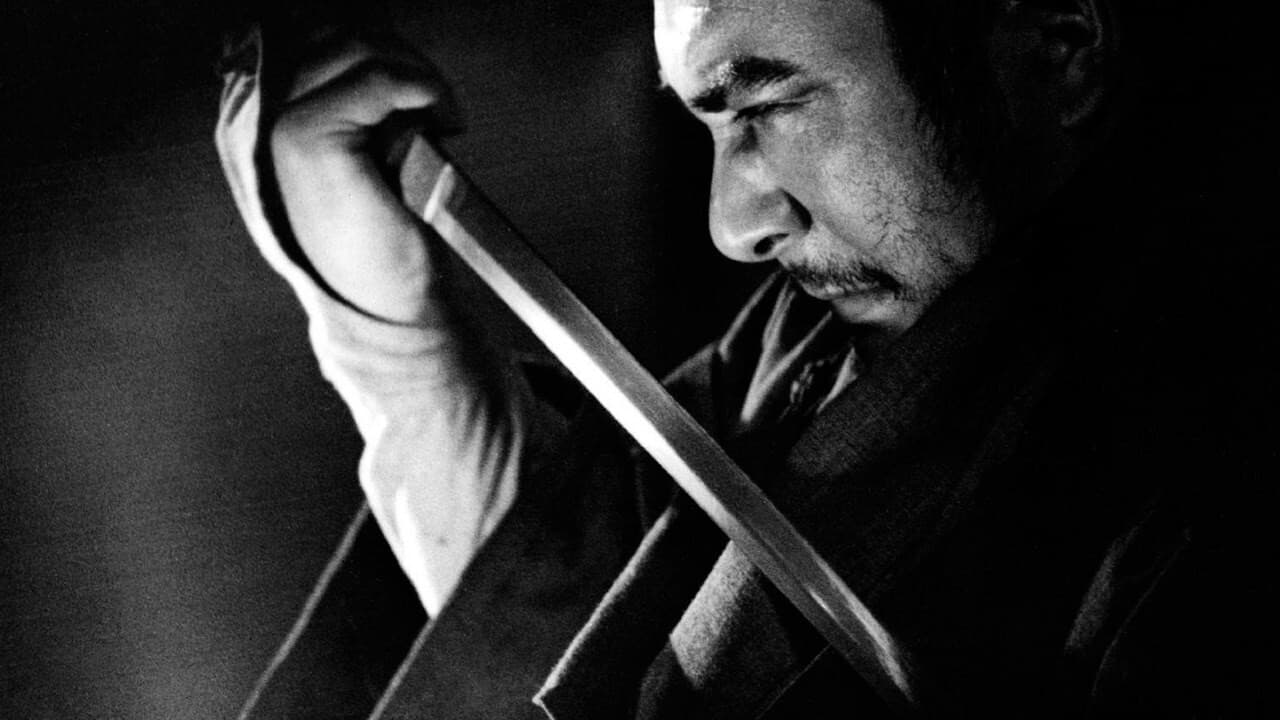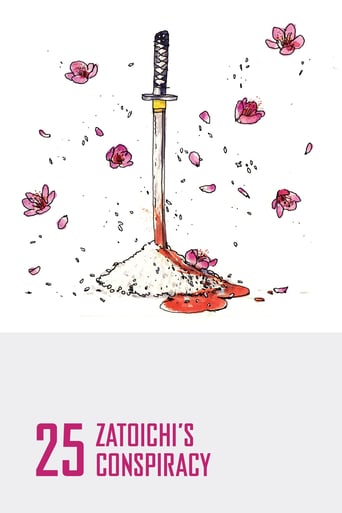



It's no definitive masterpiece but it's damn close.
View MoreHighly Overrated But Still Good
This movie feels like it was made purely to piss off people who want good shows
View MoreI enjoyed watching this film and would recommend other to give it a try , (as I am) but this movie, although enjoyable to watch due to the better than average acting fails to add anything new to its storyline that is all too familiar to these types of movies.
View MoreZatoichi's Conspiracy is the twenty-fifth and last entry in the classic Japanese franchise about the blind masseur, skilled swordsman and lowly yakuza with the strong moral compass. This movie was followed by a television series consisting of four seasons and exactly one hundred episodes that ran for five years. Main actor Shintaro Katsu would go on and direct a final movie about the character that made him famous sixteen years after this film. That last movie isn't considered a part of the classic franchise and received rather lukewarm critics. It's not included in the highly recommendable Criterion boxed set either. Zatoichi's legacy was revived recently in a few movies of which I might strongly suggest watching Takeshi Kitano's version.In this final movie of the classic franchise, Zatoichi decides to return to his hometown. He has already gone to the hometown of the master who taught him how to become a swordsman in New Tale of Zatoichi, to the hometown of the master who taught him how to become a masseur in Zatoichi's Revenge and to the town where he lived during his adolescence in Zatoichi Meets Yojimbo. This time around, he comes to a town where he stayed with a woman who breastfed him when he was a young orphan and still had his eyesight even though it was getting increasingly worse. Zatoichi learns that his adoptive mother died five years ago but meets a young woman who also grew up with her. They consider each other brother and sister and grow very fond of each other. Zatoichi also comes across a childhood friend who has become a wealthy businessman. He pays the debts of the peasants just to exploit the local quarry and employs the peasants for very low salaries. Zatoichi realizes how the citizens of his hometown are suffering when the local headman commits suicide. The father of the woman he considers his sister gets brutally killed for refusing to collaborate with the businessman. The sympathetic young woman is kidnapped to lose her virginity to the businessman. The blind masseur decides to intervene and issues his childhood friend an ultimatum to leave town. Obviously, the influential businessman doesn't follow this advice and lets his mob chase the blind swordsman who decides to confront his childhood friend who has changed for the worst.There are several positive elements about this movie. First of all, the characters have depth and the viewers care about their fates. Zatoichi's sister is a very gentle person who deserves to be saved. Her stubborn father is incorruptible and faces adversity with determination, honor and strength. The antagonist seems to be calm, generous and likable at first contact but turns out to be greedy, manipulative and perverted which makes him particularly interesting. I also liked the idea to include a group of thugs that regularly cross Zatoichi's path. Initially, they make fun of the blind man, later on try to kill him to get the hefty bounty on his head but ultimately try to help him fight the antagonist. Most of the characters are dynamic and round which is unusual for the franchise. The movie comes around with emotional dialogues that teach us more about Zatoichi's inner struggles and difficult past. The beautiful landscapes and epic classical score give the movie a slightly epic atmosphere.On the other side, the fight sequences in the film are only of an average quality at best. The set-up and the plot are at times quite predictable. Despite being the last classic movie, this film doesn't offer any type of conclusion to the franchise. This is just another classic Zatoichi movie with the blind swordsman coming to town, fighting the greedy antagonist and his mob and leaving town to continue his solitary life as a drifter.Zatoichi's Conspiracy is an average film by the franchise's standard. If it weren't the last of the classic films in the franchise, there wouldn't be anything memorable about this film. It's enjoyable to watch thanks to an epic atmosphere, some character development, and profound dialogues. One the other side, one would have expected something more spectacular for a last film in the franchise. I guess the makers of the movie were planning on continuing Zatoichi's story one day and didn't want to come around with a proper conclusion. Sadly, the television series and Shintaro Katsu's last Zatoichi film sixteen years later don't have the quality of the early franchise's best movies and fail to offer any type of conclusion. Still, after having watched all twenty-five original films, I must say it was highly entertaining to follow the franchise centered around its fascinating character set in a unique era. In my opinion, the greatest movies were Zatoichi Goes to the Fire Festival, Zatoichi Meets the One-Armed Swordsman and Zatoichi's Revenge. The least interesting movie was Zatoichi Meets Yojimbo. The franchise could have carried on because it still included a few quite strong movies in the early seventies but people became less interested in this type of movies more than a decade after its inception which isn't too surprising. If you are interested in Japanese culture and samurai cinema, you can't get around this franchise that still has its charm almost fifty years later. Start your journey in chronological order. If you like what you have seen and have made it to my last review, let me congratulate you for your stamina.
View MoreIn the previous Zatoichi film, "Shin Zatôichi monogatari: Oreta tsue" (ZATOICHI IN DESPERATION or ZATOICHI 24), the film abounded with disgusting scenes and plot elements. It certainly was the seediest and most unpleasant of the original 25 Zatoichi films. Fortunately, here in the final film before the series went exclusively to television (until Shintaro Katsu came out of retirement for the 26th Zatoichi film, the film makers decided to make the film less nihilistic and bleak. The only real similarity between 24 and 25 was the blood--there is plenty of realistic looking blood and severed limbs in both. But because the plot isn't quite so dark, the film is like the series coming back to the old formula. Now this isn't all good, because by now the films had become VERY formulaic, but at least it was more enjoyable and offered what fans of the franchise had long enjoyed.At the beginning of this film, Zatoichi is back to where he grew up though no one seems to remember him. His memories, however, are amazingly clear. In fact, when Shenbei (Zatoichi's childhood playmate) meets up with Ichi, he either doesn't remember him at all or pretends not to--while Ichi can vividly recall their youth. Sadly, however, in addition to Shenbei not recognizing Ichi as a friend, he also has changed a lot for the worse. Now instead of a humble peasant, he's a magistrate who abuses his power to both starve the peasants and overwork them in dangerous quarries he just stole from the local boss. As usual, Ichi puts up with a lot of abuse from these guys until he ultimately kicks butt to restore justice.This pattern is pretty common to almost all Zatoichi films but there were a few differences--such as how Shenbei finally gets his comeuppance as well as the presence of a gang of lowlife hippie-types who seem to randomly appear and do nasty things for no particular reason.While this film certainly is NOT a standout film in the series, it is very watchable and is a return to the older and less vile Zatoichi film of the past.
View MoreAfter a 23 year absence, Zatoichi returns to his home town to find that few remember him. But in the end the village residents will have much to remember him by.Of course Zatoichi is in a sentimental mood. There is a funny scene where Zato mistakenly thinks that the town has set up a big banquet in his honor and he frets over how to greet his guests and thank them. There is a touching scene where Zato comes across a Jizo (Buddha) statue along side a road where he used to play as a child. Jizo is missing his stone head, so Zatoichi gets on hands and knees to find the missing head. In the end he finds the head and replaces it on Jizo's shoulders. Zato visits the grave of his 'aunti' who breast fed him and offers sake (taking a nip himself :) ).The second half of the film is fast paced and has an interesting story. It's a story of greed and the story is being sown by Zatoichi's childhood friend, who has returned to the village at the same time as Zatoichi. Their confrontation is predictable, but Zatoichi takes out a host of yakuza to eventually confront his childhood friend. Overall, it's a compelling story and has a lot of good action.So this film marks the 25th film in a period of 12 years. It's interesting that the series pauses at this point. The next film (and last) will be released in 1989. I would rank Zatoichi Conspiracy higher than several of the earlier films in the series, but the Japanese public must have had enough by this point. Good work Katsu!
View MoreZatoichi's Conspiracy has our hero returning to his hometown and making the acquaintance of his "sister", a young orphan raised by the same old woman who raised Zatoichi. The bad guy is an official who also grew up in the same village and was a childhood friend of Zatoichi. He appears to be befriending the village by paying off their tax debt, but lays claim to the village quarry, which serves as the only source of income besides farming. A high point of this film is the appearance of Takashi Shimura, the hero of many Kurosawa films including Seven Samurai, as the guardian of Zatoichi's new-found sister. The ending is a little bit of a copout as Zatoichi struggles to decide whether he can bring himself to kill his old friend. A solid entertaining entry to the series.
View More